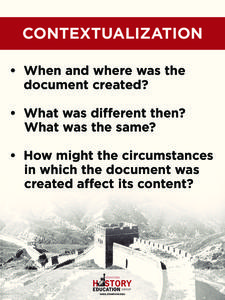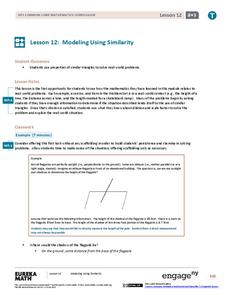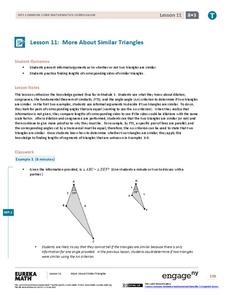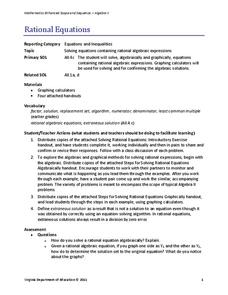Stanford University
Contextualization
Part of a series of posters designed to be used with a unit fostering the skills needed to read like a historian, this template models the questions researchers need to ask to contextualize a primary source document.
Practical Money Skills
Saving and Investing
Learn the difference between saving money and investing money, as well as the advantages and disadvantages of each. Kids review banking and personal finance terms before studying the different ways that people can reach their financial...
Practical Money Skills
About Credit
It's tempting to stay away from credit cards entirely, and it can also be tempting to charge large purchases on credit cards with the intention to pay them off later. But as a three-part lesson on credit and debt shows your high...
NASA
Lights on the International Space Station
Groups explore illumination with NASA's Lighting Environment Test Facility (LETF) as a context. Using the TI-Nspire app, groups determine the lux equation that models their simulation. They then use the lux equation to solve problems...
Thoughtful Education Press
Compare and Contrast
Encourage readers to compare and contrast the information that they find in informational text with a variety of reading passages and worksheets. Learners read all about subjects in science, social studies, and literature before...
NOAA
Vertebrates I
I spy a spine. The 19th installment of a 23-part NOAA Enrichment in Marine sciences and Oceanography (NEMO) program explores vertebrate species, such as sharks and other fish. Learners take part in an activity evaluating the...
Peace Corps
Community
What is a community? Find out with a lesson that sheds light onto the different types of communities—school, local, and global. Scholars read informational text detailing the life of a young girl from Cape Verde and take part in a...
Teach Engineering
Red Cabbage Chemistry
Using the natural pH indicator of red cabbage juice, groups determine the pH of different everyday liquids. As they work, pupils gain an understanding of pH that may help deal with contaminants in the water supply.
Teach Engineering
Maximum Power Point
Investigate the maximum power output of a photovoltaic panel with a lesson that introduces the class to the maximum power point. Individuals learn how to determine the maximum power point of a solar panel by using Ohm's law and the power...
Virginia Department of Education
Genetic Variation and Mutations
Young scientists demonstrate their creativity while completing several activities, to assess genetic variations and mutations. Instructors provide a list of options and scientists choose to write a comic strip, create a book, construct a...
EngageNY
Modeling Using Similarity
How do you find the lengths of items that cannot be directly measured? The 13th installment in a series of 16 has pupils use the similarity content learned in an earlier resource to solve real-world problems. Class members determine...
EngageNY
Informal Proof of AA Criterion for Similarity
What does it take to show two triangles are similar? The 11th segment in a series of 16 introduces the AA Criterion for Similarity. A discussion provides an informal proof of the theorem. Exercises and problems require scholars to apply...
EngageNY
More About Similar Triangles
Determine whether two triangles are similar. The lesson presents opportunities for pupils to find the criterion needed to show that two triangles are similar. Scholars use the definition of similarity to find any missing side...
EngageNY
Exponential Notation
Exponentially increase your pupils' understanding of exponents with an activity that asks them to explore the meaning of exponential notation. Scholars learn how to use exponential notation and understand its necessity. They use negative...
Virginia Department of Education
Rational Equations
Provide guidance and practice of the useful skill: solving rational equations using both an algebraic and graphical approach. Pupils solve increasingly more difficult rational equations using algebraic methods. After, they study steps to...
Curated OER
An Exploration of Cradle-to-Cradle Design Thinking
Introduce cradle-to-cradle design thinking. Scholars first discuss the importance of natural laws and rights. They then use a variety of online and print resources to research eco-efficiency and cradle-to-cradle design.
National Institute of Open Schooling
Solutions
Aqua regia, or royal water in Latin, is a solvent that can dissolve solid gold and platinum into a solution. Activity nine in a series of 36 allows classes to learn, through readings and answering questions, what a solution is and the...
Chicago Botanic Garden
Food for Thought: Climate Change and Trophic Cascades
Learners examines the arctic food web with a short video about polar bears and an article about bears and warming temperatures. They design an arctic food web and discuss the trophic cascade that could come from climate change.
Pennsylvania State University
Learn, Protect, and Promote Water
A hands-on activity helps learners explore the water cycle. After discussing how they use water, classes discuss water pollution and then move into a simulation where 20 pupils move through the water cycle based on description cards.
EngageNY
Exponents
Powered up! Here's a great resource on exponents. Scholars build on their previous understanding of exponents to include all positive real number bases. Distinguishing between an and a^n is a major goal in the fifth activity of a 36-part...
EngageNY
Writing and Expanding Multiplication Expressions
Find out what's so standard about standard form. Scholars learn to write multiplication expressions with variables in the 10th lesson in a series of 36. They use different symbols for multiplication and translate between standard and...
Channel Islands Film
Island Cattle Ranching
Is cattle ranching on Santa Rosa island viable or non-viable? Rather than focusing on the issues of the transition of Santa Rosa island from a privately owned island cattle ranch to a national park, class members are asked to consider if...
Annenberg Foundation
A Nation Divided
Can a presidential election cause a civil war? Learners research the events surrounding the presidential election of 1860 in a lesson that explores America's history. Using maps, videos, and primary sources, they uncover, brainstorm, and...
Facebook
Different Perspectives
What do people's social media profiles say about them? Explore diverse perspectives and digital citizenship in an activity designed with self-identity in mind. Pupils reflect on their own profiles, then collaborate to examine...
Other popular searches
- Greatest Common Factors
- Common Factors Multiples
- Highest Common Factor
- Common Factors and Multiples
- Least Common Factor
- Math Greatest Common Factors
- Lowest Common Factors
- Math Common Factors
- Common Factors Fractions
- Common Factors in Math
- Maths Highest Common Factor
- Common Factors of 200

























